Corpus Assignment
Introduction
I have decided that for the Corpus assignment, I am going to compare the lyrics of Pink Floyd albums to an individual Pink Floyd Album: The Wall. I chose this because I have been listening to the Pink Floyd discography as of late, and being able to compare The Wall, my favorite album, to the others could help me understand more about their music. It should be noted that I am excluding compilation albums so as to not have repeats in my assessments. I have gathered all of the lyrics from Genius, the music lyric service. Any time that AntConc is used, I grouped together The Wall with the rest of the Discography so that I may see the consistency of different parts all together. Additionally, the text file abbreviations are visible, so anything abbreviated is in the Discography, while The Wall is not, so it is visible as "PF The..." in the file viewer, if the importance of it is found useful to the viewer. The original transcribed text files that I analyzed are visible here.
Reflection
In my analysis of The Wall and the rest of the Pink Floyd Discography I was able to pull apart the lyrics that lie inside the albums. From the darker, more complex album of The Wall, one can notice important words and phrases. Some of these words include Run, Goodbye, Need, Home, and Crazy. In comparison, the rest of the discography has a wider slew of words, but still some similar words with negative undertones. Some examples are Crazy, Away, and Cold. Some more interesting words appear in both albums, notable ones being Time, Feel, and the recently mentioned word Crazy. One of the biggest words that show up in the cloud is "Instrumental." As I was organizing the albums, I knew that the system would display the word instrumental a lot, even though it wasn't a real lyric in any album. I chose to keep it so that it could be studied. Instrumental solos and songs in general are very common in Pink Floyd. It is an essential cog in the machine of their style, and to demonstrate how often it shows up, I decided to leave it in the cloud results.
Another very important word includes "Time." Within the lyrics, it is usually in the context of time itself, rather than as a supporting word. This is a great example of how often the members of Pink Floyd write about struggles with time, either as an individual or as members of a society. The main culprit of the word count for "Time" is most likely a song of the same name in the album The Dark Side of the Moon. It is a song that is about how time escapes us and how it passes us by. As for The Wall, "Time" appears repeatedly in a few songs. Notably, the KWIC gave context to this with "time to go" as a frequent phrase. It serves more of a narrative-like context rather than as a main focus, but still has the common theme of the concept of time pulling the character into something. By this I mean that the phrase "time to go" is used as a way to communicate that the story of The Wall includes aspects of time constricting people. Below, images of the Word Cloud for all of the albums except The Wall will be grouped together, while The Wall has its own Word Cloud just beside it. I am also including an image from AntConc to show how the word "Time" comes together in different albums.
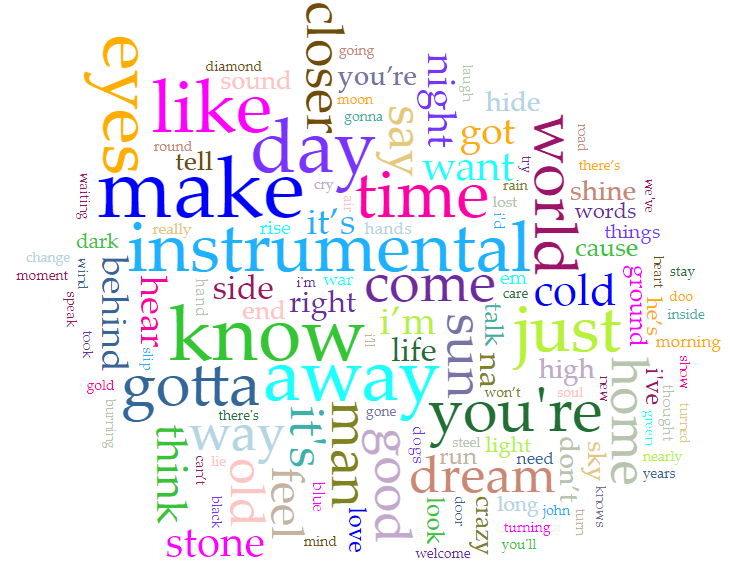
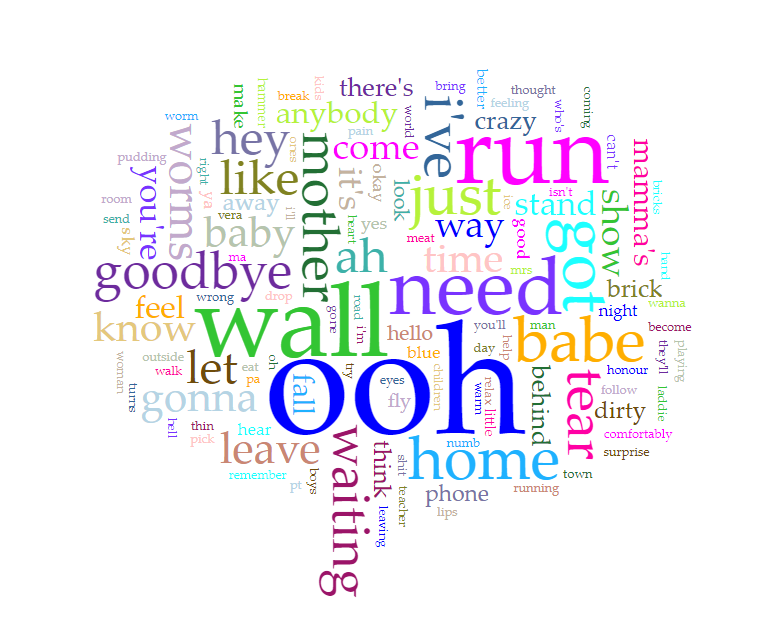
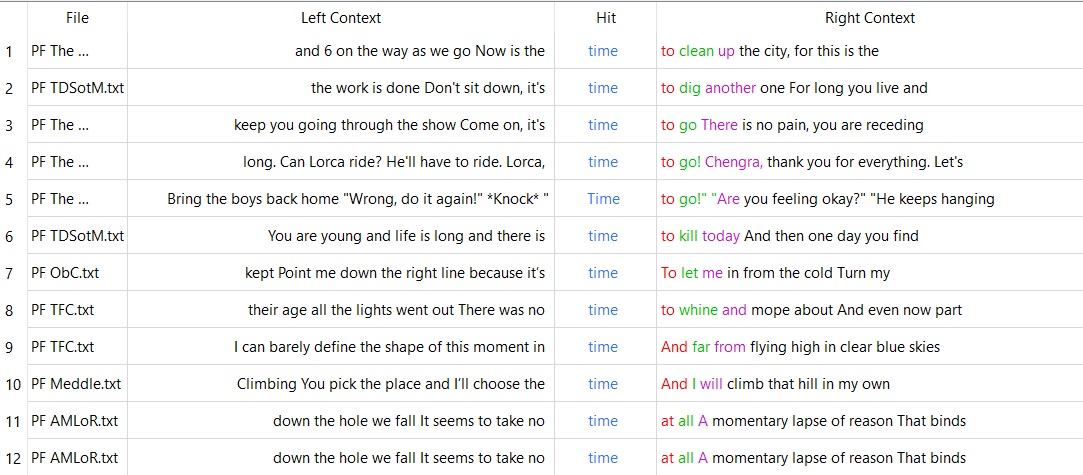
A few of the common NGram results I've found can be seen below. I've found that some terms, such as "in the" came back as the most frequent 2-word phrase, appearing 109 times. Looking at the results for 4 NGram results, I noticed something very interesting that involves a difference between The Wall and the rest of the Pink Floyd Discography. I noticed that there were mostly phrases from lyrics included in The Wall. There weren't many results for other albums; they seemed to be drowned out by The Wall. I realized that this was the amount of repeated phrases said over the course of The Wall, and it made more sense. The Wall is a double album, it is the longest product made by Pink Floyd, and has the most concise and similar theme throughout the album. This was a great thing to notice when comparing it to the Discography, as it provided insight into how many repeated phrases showed up in The Wall as opposed to the others.
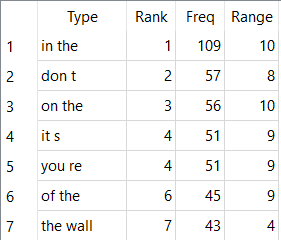
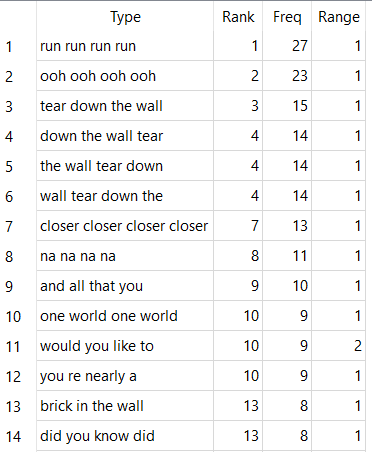
While using AntConc’s Ngram counter, I found a few phrases and words that seemed like they might be more useful in understanding how Pink Floyd used them in each album. One phrase that stood out was “in the.” I put it into the KWIC and found that even though there aren’t many direct connections apart from “in the end…” appearing in multiple albums, especially The Wall, the consistency that the band’s members wrote many lyrics using the prepositional phrase is apparent. It may be noted that it is a common idea that the band is drawn to for reasons that are potentially related to how the characters or listeners of the songs are placed into the narrative. Whether a character is placed in a certain location, physically or metaphorically, or if the listener is meant to be in that place or imagining it using the helper words written by the band. Essentially, The Wall uses it in a narrative context in almost every instance, whereas the other albums include it as a simple prepositional phrase without as much intention hiding behind it. From this, it is shown that The Wall is a more complex album with ideas that the listener is more meant to put themself into and visualize their surroundings, rather than simply relate to it.
Another similar situation is seen in the word “like.” When looking through the KWIC, it can be noted that the word is typically used in a context of attraction to something. Other uses include it being used as a simile, letting the listener interpret the music in a way that the band intended them to, but still with some flexibility so as to allow the listener to form independent thoughts and interpretations of the music and what it means to them. This is common between every album, although I have noticed that The Wall happens to have more rhetorical questions that are meant to serve as narrative points. The Wall has many common themes of desire, and the nature of the word "like" in The Wall is used to express that desire in a somewhat rhetorical sense, prompting the listener to think about themselves along with the narrative of the main character. Below is a few images of the KWIC in use, showing examples of the phrase “in the” and the word “like.” I’ve also included a table of “like” collocated in AntConc, and the 4 NGram table.
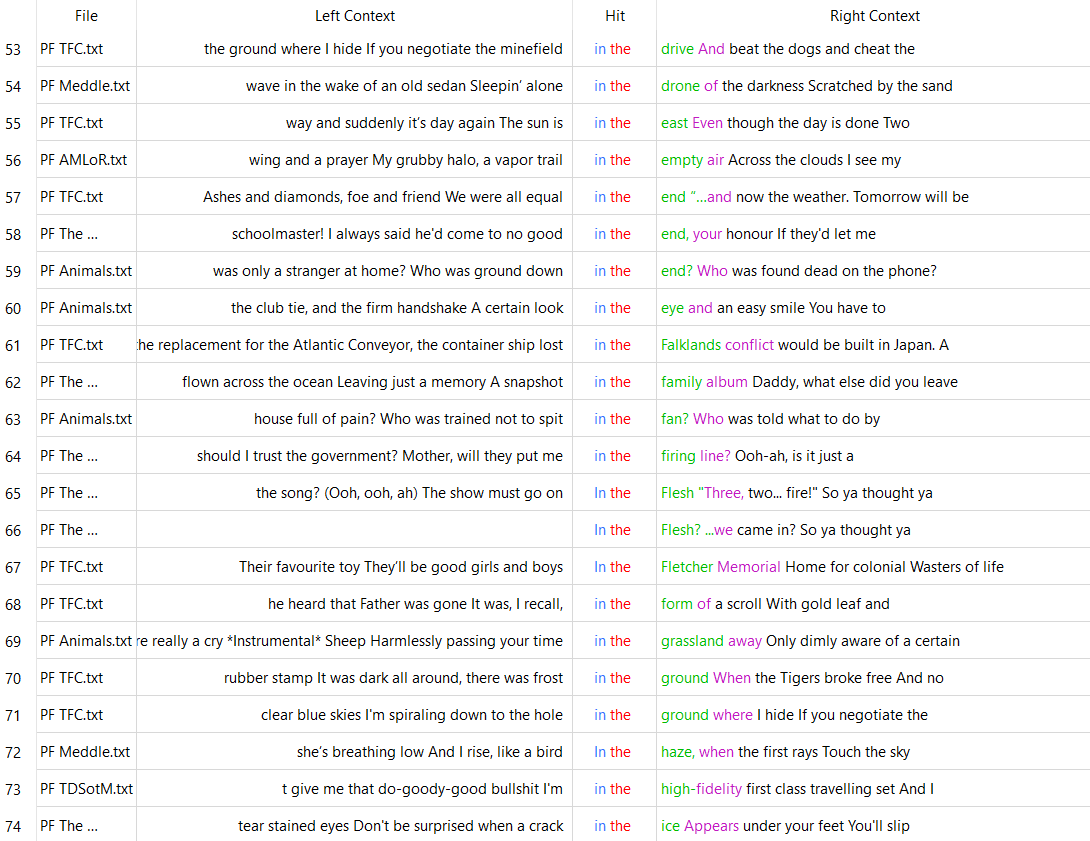
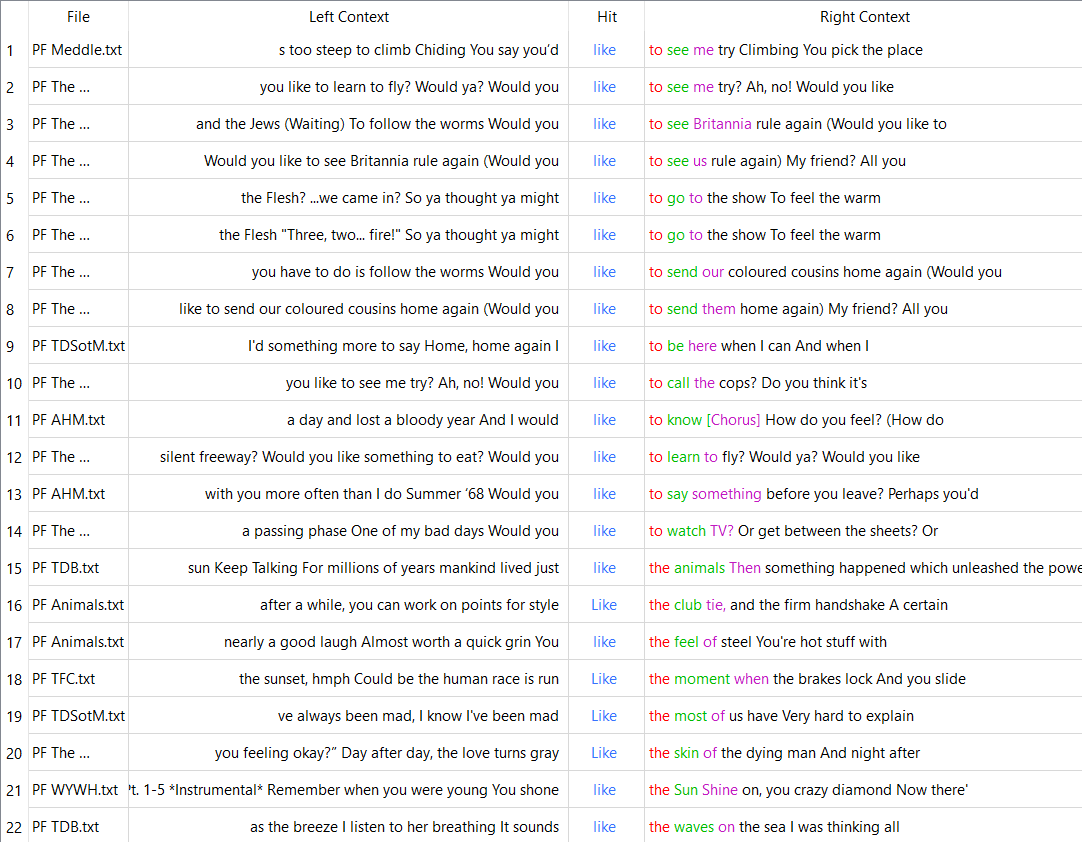
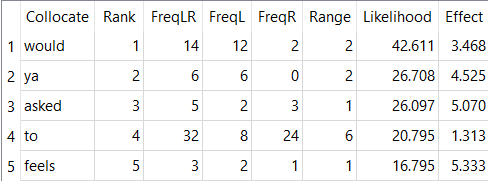
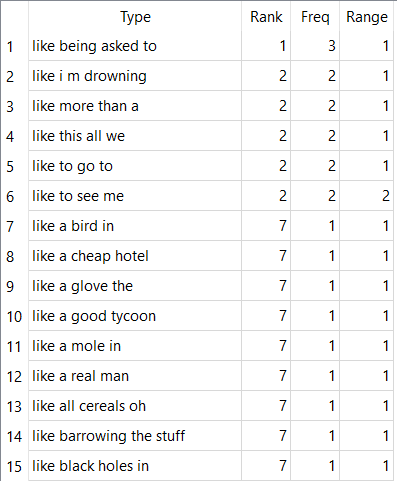
In conclusion, I feel that I have learned more about the albums that I listen to quite frequently. I succesfully analyzed the similarities and differences in the Pink Floyd Discography compared to the outstanding album that is The Wall in that I found common and uncommon words and phrases that correlate between the two.I essentially discovered common themes that make each album stand out, especially The Wall.